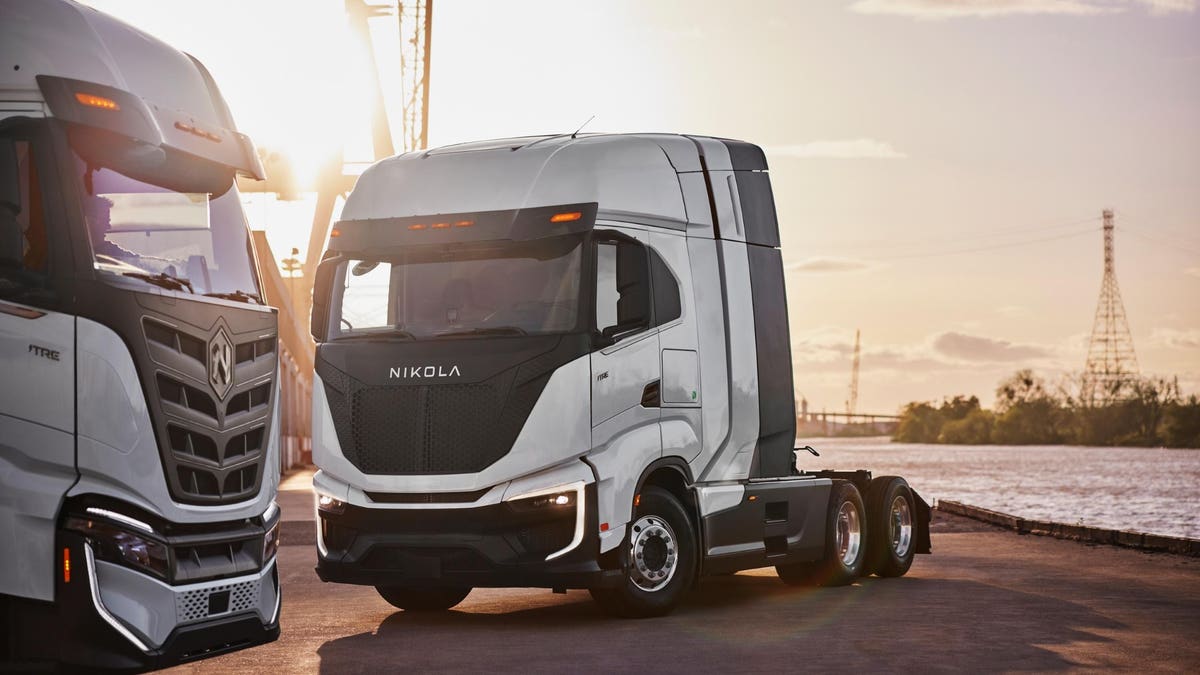Electric truckmaker Nikola has had a bad month. Since it announced a surprise management change just days before recalling all its battery-powered big rigs for potential fire risk, its stock has tumbled 61%. But amid the turmoil, the company says it remains on track to be the first manufacturer to deliver hydrogen fuel cell semis to customers this year.
The recall, announced Aug. 11, affected all 209 Tre BEV trucks delivered to customers and dealers in the past year, but a fix is in the works, CEO Steve Girsky told Forbes, without elaborating. Production of the model at Nikola’s Coolidge, Arizona, plant had already stopped temporarily owing to a surplus of unsold units and as the company prepares to build fuel cell Tres on the same assembly line.
“We’ve started the process of pulling trucks back to get them worked on at Coolidge and then it’s about launching the hydrogen truck,” said Girksy, previously Nikola’s chairman, who began running the Phoenix-based company just days before the recall. “There are challenges with any launch and we’re grinding through those. Everything this company had the vision for three years ago is coming to a head in the next six months in terms of launching the hydrogen truck and getting the stations up. It’s the chicken and the egg coming together.”
Nikola’s survival as a company could hinge on its ability to scale up production of nonpolluting hydrogen trucks — which it says will be able to haul loads at least 500 miles per tank — and ensure there are stations to provide the fuel.
Girsky, a long-time equity analyst and former General Motors vice chairman, is tightening Nikola’s business strategy from the wide-ranging vision of ousted founder Trevor Milton, who’s awaiting sentencing for securities and wire fraud convictions. Three years ago, the company’s plans also included large-scale production facilities making “green” hydrogen from water and renewable power, international operations, a pickup truck, electric watercraft and all-terrain and military vehicles. Now it’s limited to building and selling hydrogen and battery trucks and setting up fuel stations with partner companies.
“The company had big eyes and a small stomach,” Girsky said. “They wanted to do lots of things but didn’t have the money for it.”
Fueling Plans
In July, the company was awarded about $42 million from the California Transportation Commission to open six heavy-duty hydrogen stations with partner Voltera, but it will take a few years to get them up and running. So to provide fuel for its first hydrogen trucks, which are heading to California, it will initially use mobile fueling units that can support up to 30 trucks per day.
Girsky was tapped to be CEO this month after Michael Lohscheller unexpectedly left the role, citing a “family health matter.” A veteran auto executive, Lohscheller held the top job for less than a year, replacing Mark Russell in November 2022.
“The original members of the management team have all departed from the firm, and understandably, investor nervousness around the near-term execution and mid-term targets is somewhat exacerbated by the departure of its fairly recent new CEO,” Deutsche Bank analyst Emmanuel Rosner said in a research note.
For the moment, the company’s financial situation has stabilized, Girsky told Forbes. In July, Nikola sold its green hydrogen production facility in Phoenix to Fortescue Future Industries for $24 million and now plans to source fuel from it for its trucks. And this week it raised $125 million with a convertible bond offering that investors don’t seem to like, with an option to raise up to $200 million more. Those funds will help cover costs related to launching the hydrogen truck business but will also be needed for recall expenses, which may be “significant,” it said in a filing. Additionally, “there can be no assurance as to when we will be able to resume production of our BEV trucks,” the company said.
Problems with the battery truck business are the latest setback in the rocky three years since Nikola went public, but the company intends to continue building them. Girsky said there’s demand for such vehicles for short-range trucking routes, such as from ports in Southern California to distribution centers. Hydrogen trucks, however, remain its core focus. And it wants to get into that market ahead of big competitors like Daimler, Hyundai (which operates Xcient fuel cell trucks at the Port of Oakland)and Toyota (which is making fuel cell systems for truckmaker Kenworth).
“I know there are a lot of doubters,” Girsky said. “Nobody thought this company could engineer a truck and it did. Nobody thought they could manufacture a truck and we are, and nobody thought we could sell a truck and we’re doing that. Nobody thinks we can build a fuel cell truck and dispense hydrogen at the same time and we’re going to execute on that as well.”
Read the full article here





